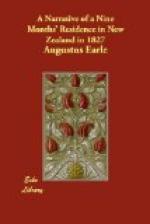April 20th.—For the last week we were stationary at the river’s mouth, waiting for a fair wind to carry us over the bar; and during that time there was no appearance of any change; we also heard that vessels had been detained here for six weeks before they could accomplish it. We were visited daily by parties of natives, who seemed to rejoice at our being delayed, as it gave them more of our company than they had calculated upon. They were more delighted with our society than we were with theirs; in a small vessel they are a serious nuisance, on account of the swarms of vermin they bring with them, and which they communicate liberally to all. Myself and all the passengers on board had our leisure time fully occupied in dislodging these “little familiars” from their strongholds in different parts of our apparel.
During the time we were lying here, I saw and conversed with several individuals who had attended the “Great Meeting,” and their accounts gave rise to various opinions respecting the policy of supplying the natives with firearms. As I had always been an advocate for the measure, I was gratified by hearing that it was thought to be in consequence of each party’s being possessed of a nearly equal quantity of muskets, that a general and exterminating war was avoided. Some may suppose that similar tranquility would have been preserved, had they been equally well supplied with their native weapons of war; but that would not have been the case. When they found that each party could furnish forth the same number of European muskets, they paused, well knowing that it was contrary to the wish of all the white settlers that they should proceed to hostilities. Indeed, Europeans intrepidly mingled amongst them, urging them to a reconciliation, and threatening that, if they failed in their endeavours, the supplies of arms and ammunition should be discontinued. This threat had its desired effect on the minds of the natives; no blood was spilt, and each chief returned quietly to his own home.
On the night we heard of the death of George and his wife, “Revenge and war” was the universal cry. His party would not believe that it could be an accident, nor would they hear of any apology being received. At this time they imagined the tribes of Hokianga were possessed of but very few firearms; and, as the skirmish took place in that district, it was determined that an exterminating war should be carried into the heart of it. However, before all the preparations could be made to carry their intentions into effect, they received certain information that the people of Hokianga were even better supplied with muskets than those of the Bay of Islands. This intelligence occasioned an assemblage of the different tribes to be proposed, and when it took place the friends of George saw their opponents so well prepared for the “tug of war” that they deemed it judicious to come forward and to shake hands and to acknowledge that the death of Shulitea proceeded either from accident




